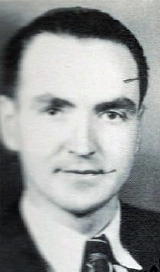LANDMARK GRAVEN IMAGE CASE IN CALHOUN - Supreme Court Hears Don McGlothlin Battle
The Pledge of Allegiance is coming under attack in America's court system, this time related to the insertion of "under God" to the oath in 1954. The challenge to the Pledge will likely go to the Supreme Court.
West Virginia's Senator Robert Byrd, leading the U. S. Senate in the Pledge, asked "What are we coming to when we cannot speak the name of God? Let them throw me in jail!" Byrd is the only senator who was in the body when the "under God" statement was inserted in '54.
"Throw it back in the faces of stupid judges," yelled Byrd, decrying atheism.
The current affray recalls a 1941-42 landmark case over the Pledge which surfaced in Calhoun County, and was ruled upon by the Supreme Court in 1943 (State Board of Education vs. Barnette).
Grantsville resident Naomi Ball, a graduate of the Class of '43, said she remembered those school assemblies, particularly when a local girl named Kelley was the center of attention when she would not salute and not say the pledge.
During the patriotic fervor of World War II, more than one Calhoun County High student refused to recite the oath, even though the West Virginia Board of Education had mandated it. The students, Jehovah's Witnesses, declined the oath based on their religious beliefs.
Saluting the flag, according to the religious group, was like saluting a graven image, referencing Exodus, chapter 20. "Thou shalt not make unto thee any graven images, or any likeness of anything that is in Heaven above, or that on the earth beneath...."
The Witnesses felt the stiff-arm salute to the flag was similar to the Hitler salute. Their church teaches "The obligation imposed by the Law of God is superiod to the law enacted by temporal government."
 High school principal Don McGlothlin (pictured left) a graduate of Ohio State University, refused to
force the students into compliance, based upon his understanding of First
Amendment religious freedom. He was promptly fired by the Calhoun County Board of
Education.
High school principal Don McGlothlin (pictured left) a graduate of Ohio State University, refused to
force the students into compliance, based upon his understanding of First
Amendment religious freedom. He was promptly fired by the Calhoun County Board of
Education.
Ball said,"The man was run out of the county."
McGlothlin was partially vindicated by the Supreme Court decision which said compelling students to recite the Pledge was held to be a First Amendment violation (State Board of Education vs. Barnette-1943). McGlothlin left the state and went on to have an illustrious educational career.
In 1942 he joined the U.S. Navy, serving actively in the South Pacific until the end of World War II, and retired as a lieutenant commander U.S.N. in 1955.
The court said "The action of the local authorities in compelling flag salute and pledge transcends constitutional limitations on their power and invades the sphere of intellect and spirit which is the purpose of the First Amendment to our Constitution."
McGlothlin began writing a book "Inland Retreat," a history of Calhoun County, in which he described the early Calhoun County High School. His unfinished work ended abruptly when he was fired, although later in life he published a biography of Ronald Reagan, and returned one day to talk about his book with local high school students.
Growing up in a large family near Leatherbark, described by acquaintances as "impoverished," he entered higher education by hitch-hiking to Glenville State College.
Calhoun resident Von Yoak said "Calhoun lost a great man when he was run out of this county." He said McGlothlin carried his belongings in a paper bag, back and forth to Glenville State, sometimes sleeping in the woods." He would have his clean shirt, a tall man, his pants half-way up his kneees. Yoak said he completed (undergraduate) college in three years.
In a May, 1943 edition of the school newspaper, McGlothlin wrote to the Senior Class, urging them to be patriotic and persevering during the great war.
Shortly after the incident, Calhoun County High School burned to the ground. Some local residents felt it was arson, related to the Pledge conflict.
The current challenge to the Pledge relates to the removal of the "under God" phrase, igniting religious reaction, but in 1941-42 the issue was having the religious freedom not to recite the Pledge.
The struggle for freedom during W.W.II continued after the Pledge incident, with death and destruction circling the globe. A recent study of Appalachian soldiers who died for that cause is a statement about fear and sacrifice. Soldiers from all West Virginia counties died in greater numbers than anywhere in America.
In 1940 the graduating class of Calhoun High had 135 members, but by 1946 the class had dwindled to 58, with only 11 males.